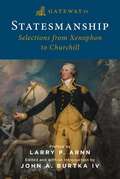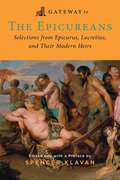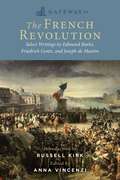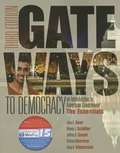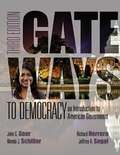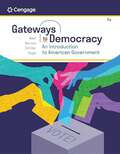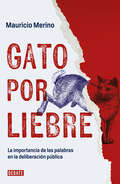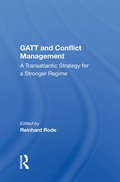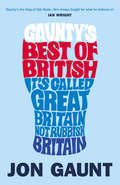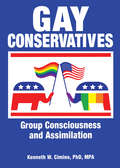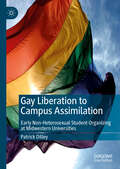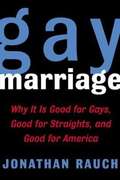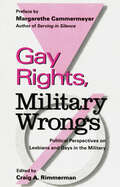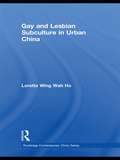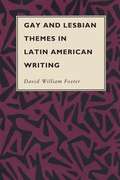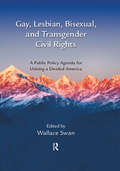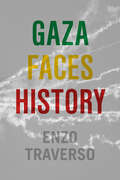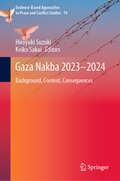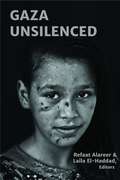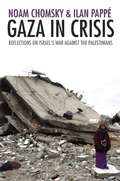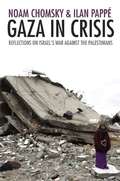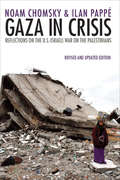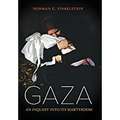- Table View
- List View
Gateway to Statesmanship: Selections from Xenophon to Churchill
by IV John A. BurtkaThe study of statesmanship is not a subject for leaders in politics alone. It is the study of the whole human being in thought and action.The classics teach us of the difficult choices that must be made, an activity that guides lives and forms character. This collection of writings includes ancient, Medieval, Renaissance, and modern scholarship on statesmanship from Xenophon, Aristotle, Cicero, Augustine, Erasmus, Niccolo Machiavelli, George Washington, Theodore Roosevelt, Winston Churchill, and more, selected and with an introduction by the president of the Intercollegiate Studies Institute, John A. Burtka.
Gateway to the Epicureans: Epicurus, Lecretius, and their Modern Heirs
by Lucretius EpicurusThe Greek Philosopher behind Nearly Every Bad Idea
Gateway to the French Revolution: Edmund Burke's Reflections on the Revolution, Friedrich von Gentz's Revolutions Compared, and Joseph de Maistre's On God and Society
by Edmund BurkeGateway to the French Revolution features voices critical of the French Revolution and its aftershocks. Edmund Burke&’s critique of the Revolution is widely known and set into motion the development of political Conservatism. Also decrying the excesses of the Terror is Friedrich Gentz, a lesser-known Austrian diplomat who would become an architect of European peace after Napoleon&’s failed ambitions, and Joseph de Maistre, a Savoiard nobleman whose own reflections would form a current of counter-revolutionary reactionary that has continues to have implications in our contemporary world.
Gateways to Democracy (Third Edition)
by Jeffrey A. Segal Wendy J. Schiller John G. Geer Dana K. Glencross Richard HerreraThe Essentials versions of GATEWAYS TO DEMOCRACY introduces readers to the American political system, pointing out in each chapter the "gateways" that facilitate, or at times block, participation. In emphasizing how the political system works-and how individuals and groups have opened gates to influence public policy-the book helps readers see the relevance of government in their lives. The third edition provides coverage of the 2014 midterm elections as well as enhanced discussion of the politics, policies, and issues affecting Latinos in the United States.
Gateways to Democracy: An Introduction To American Government
by Jeffrey A. Segal Wendy J. Schiller John G. GeerNIMAC-sourced textbook
Gateways to Democracy: An Introduction to American Government
by Jeffrey A. Segal Wendy J. Schiller John G. Geer Richard HerreraUnraveling the complexities of the U.S. political system, Geer/Herrera/Schiller/Segal's GATEWAYS TO DEMOCRACY, 5th edition, highlights the "gateways" that facilitate—or block—participation. Illustrating the relevance of government to your personal life, the authors explain how the political system works and how individuals and groups opened gates and overcame barriers to influence public policy. <p><p>Completely up to date, the 5th edition includes expansive coverage of the 2020 elections, the COVID-19 pandemic, diversity (with a focus on Black and Latino activism), the advancement of LGBTQ rights and other issues reflecting America's changing demographic infrastructure. Supreme Court cases illustrate the constitutional context in which U.S. democracy has evolved, while a Political Analytics feature helps you evaluate the vast amounts of data in today's political discourse
Gato por liebre: La importancia de las palabras en la deliberación pública
by Mauricio MerinoESTE LIBRO HABLA SOBRE CÓMO SE HA PERVERTIDO EL LENGUAJE POLÍTICO CON LA 4T Gato por liebre parte de la convicción de que los regímenes políticos más poderosos han sido aquellos capaces de crear palabras y modificarlas a placer, ya sea parar recrear la realidad, ignorarla o bien para domarla: he ahí la piedra basal de cualquier dominación y, a la postre, del totalitarismo. Pero también sabemos que eso es cierto hasta que brotan las que contradicen: las que se oponen a lo dicho. Por eso, la mejor defensa contra los excesos del poder —quizás la única— es volver a las palabras. Si con ellas hemos sido sometidos, con ellas seremos liberados. De eso trata este libro: escombrar entre las palabras que colman el mito del poder y cuyo significado se ha puesto al serviciode quienes las pronuncian para establecer y prolongar su dominio sobre los demás. Con esta premisa, el autor recorre los vocablos que mayor tortura han sufrido en los últimos años, y nos recuerda el significado real que tienen o deberían tener.
Gatt And Conflict Management: A Transatlantic Strategy For A Stronger Regime
by Reinhard RodeThis book presents the views of an international group of trade experts, who analyses the policies of the United States, Japan, and the European Community vis-a-vis the GATT. It is based on an October 1988 conference on GATT issues held at the Peace Research Institute Frankfurt, Germany.
Gaunty's Best of British: It's Called Great Britain, Not Rubbish Britain
by Jon GauntGaunty's Best of British is one man's cheerful look at what's right - and what's wrong - with his country, and a brilliantly entertaining guide to how Britain can be Great again. Jon Gaunt embarks on a tour of the best bits of this green and pleasant land, celebrating all things British. His forthright tribute is an aptly eclectic collection, covering everything from cricket, foxhunting and the FA Cup, to great inventions like the Spitfire, the Mini and the miniskirt, and our unofficial national cuisine of fish and chips washed down with a cup of tea or a pint of real ale. Whether you live in Coventry or Cambridge, Liverpool or London, now is the time to join Gaunty and start shouting about this fantastic country and what makes it so Great.
Gay Conservatives: Group Consciousness and Assimilation
by Kenneth Cimino WDiscover why LGBT voters support conservative political platforms that don&’t benefit the LGBT communityRecent studies show that the vast majority of the LGBT community considers itself politically liberally. Yet nearly 25% of all LGBT voters helped re-elect George W. Bush in 2004-who are these people and why did they make that choice? Gay Conservatives examines why conservative LGBTs join political groups and support political candidates that not only don&’t favor policies that benefit the LGBT community, but in some cases, advocate prejudicial policies. This thought-provoking book looks at the impact of "group consciousness" on conservative LGBTs and how it affects political power and social construction. Gay Conservatives uses both quantitative and qualitative studies that center on conservative LGBTs within in the LGBT community, while using data collected on liberal LGBTs for comparison purposes. Log Cabin Republicans and StoneWall Democrats in several cities were interviewed and an online survey of more than 1,000 LGBTs was conducted by the Gill Foundation in an effort to understand the political identity of conservative LGBTs and how it fits into the bigger picture in the LGBT community. The book examines how-and why-conservative LGBT activity conflicts with the general interests of the community, including the "constitutional" rights of LGBT individuals to marry, whether LGBTs should be allowed to serve openly in the United States military, and whether state and local governments should play a more significant role in dealing with hate crimes directed at the LGBT community.Topics discussed in Gay Conservatives include: group consciousness and minority identity pluralism David Truman the homosexual identity stages the history of the gay liberation movement creating a group identity the Mattachine Society Stonewall the impact of AIDS the rise of "Queer Nation" the difficulties of "coming out" and much moreGay Conservatives is an enlightening and educational read for anyone interested in politics and the political behavior of voters in the United States.
Gay Cuban Nation
by Emilio BejelWith Gay Cuban Nation, Emilio Bejel looks at Cuba's markedly homoerotic culture through writings about homosexuality, placing them in the social and political contexts that led up to the Cuban Revolution. By reading against the grain of a wide variety of novels, short stories, autobiographies, newspaper articles, and films, Bejel maps out a fascinating argument about the way in which different attitudes toward power and nationalism struggle for an authoritative stance on homosexual issues. Through close readings of writers such as José Martí, Alfonso Hernández-Catá, Carlos Montenegro, José Lezama Lima, Leonardo Padura Fuentes, and Reinaldo Arenas, whose heartbreaking autobiography, Before Night Falls, has enjoyed renewed popularity, Gay Cuban Nation shows that the category of homosexuality is always lurking, ghostlike, in the shadows of nationalist discourse. The book stakes out Cuba's sexual battlefield, and will challenge the homophobia of both Castro's revolutionaries and Cuban exiles in the States.
Gay Liberation to Campus Assimilation: Early Non-Heterosexual Student Organizing at Midwestern Universities
by Patrick DilleyThis book outlines the beginning of student organizing around issues of sexual orientation at Midwestern universities from 1969 to the early 1990s. Collegiate organizations were vitally important to establishing a public presence as well as a social consciousness in the last quarter of the twentieth century. During this time, lesbian and gay students struggled for recognition on campuses while forging a community that vacillated between fitting into campus life and deconstructing the sexist and heterosexist constructs upon which campus life rested. The first openly gay and lesbian student body presidents in the United States were elected during this time period, at Midwestern universities; at the same time, pioneering non-heterosexual students faced criticism, condemnation, and violence on campus. Drawing upon interviews, extensive reviews of campus newspapers and yearbooks, and archival research across the Midwest, Patrick Dilley demonstrates how the early gay campus groups created and provided educational and support services on campus–efforts that later became incorporated into campus services across the nation. Further, the book shows the transformation of gay identity into a minority identity on campus, including the effect of alliances with campus racial minorities.
Gay Marriage: Why It Is Good For Gays, Good For Straights, And Good For America
by Jonathan RauchA leading Washington journalist argues that gay marriage is the best way to preserve and protect society's most essential institution <P><P> Two people meet and fall in love. They get married, they become upstanding members of their community, they care for each other when one falls ill, they grow old together. What's wrong with this picture? Nothing, says Jonathan Rauch, and that's the point. If the two people are of the same sex, why should this chain of events be any less desirable? Marriage is more than a bond between individuals; it also links them to the community at large. Excluding some people from the prospect of marriage not only is harmful to them, but is also corrosive of the institution itself. <P> The controversy over gay marriage has reached a critical point in American political life as liberals and conservatives have begun to mobilize around this issue, pro and con. But no one has come forward with a compelling, comprehensive, and readable case for gay marriage-until now. Jonathan Rauch, one of our most original and incisive social commentators, has written a clear and honest manifesto explaining why gay marriage is important-even crucial-to the health of marriage in America today. Rauch grounds his argument in commonsense, mainstream values and confronting the social conservatives on their own turf. Gay marriage, he shows, is a "win-win-win" for strengthening the bonds that tie us together and for remaining true to our national heritage of fairness and humaneness toward all.
Gay Rights at the Ballot Box
by Amy L. StoneThe passage of the anti-gay marriage Proposition 8 in California in 2008 stunned gay rights activists across the country. Although facing a well-funded campaign in support of the ballot measure, LGBT activists had good reasons for optimism, including the size and strength of their campaign. Since 1974, the LGBT movement has fought 146 anti-gay ballot initiatives sponsored by the religious right and has developed innovative strategies to oppose these measures. In Gay Rights at the Ballot Box, Amy L. Stone examines how the tactics of LGBT activists have evolved and unravels the complex relationship between ballot measure campaigns and the broader goals of the LGBT movement.The first comprehensive history of anti-gay ballot measures, both those merely attempted and those successfully put before voters, this book draws on archival research and interviews with more than one hundred LGBT activists to provide a detailed account of the campaigns to stop such ballot measures from passing into law. As Stone shows through in-depth case studies, although LGBT activists lost the vast majority of these fights, they also won significant statewide victories in Oregon in 1992 and Arizona in 2006, and local successes, including ones in Ypsilanti, Michigan, in 1998 and 2002. Stone analyzes how LGBT activists constantly refined their campaign tactics in response to both victories and defeats. She also stresses that such campaigns have played both a complementary and contradictory role within the LGBT movement. Specific anti-ballot campaigns and the broader movement do often strengthen each other. However, ballot measure campaigns sometimes distract activists from the movement&’s more general goals, and activists at the movement level can pressure local campaigns to take on more than they can handle. With gay rights coming under increasing assault from the religious right, this book is a vital resource for LGBT activists and others working to block their efforts.
Gay Rights, Military Wrongs: Political Perspectives on Lesbians and Gays in the Military (History Reference Ser.)
by Craig A. RimmermanFirst Published in 1996. Routledge is an imprint of Taylor & Francis, an informa company.
Gay and Lesbian Subculture in Urban China (Routledge Contemporary China Series)
by Loretta Wing HoThis book contributes to a critical understanding of how Chinese same-sex identity in urban China is variously imagined; how it is transformed; and how it presents its resistances as China continues to open up to global power relations. Equally important, the book will 1) sharpen knowledge of China’s recent socio-economic change and political agenda, 2) build a greater awareness of Chinese cultural, sexual and ethical values and 3) offer new perspectives on ‘Chineseness’ and Chinese same-sex identity. Uniquely, it explores the emergence of Chinese same-sex identity through understanding the everyday, lived same-sex experience, amid China’s opening up to cultural, sexual and economic globalisation. This understanding is based on a culturally sensitive framework which accommodates the diverse and sometimes paradoxical articulation of same-sex identity in urban China. It come sto the conclusion that same–sex identity in china is articulated in a paradoxical way: open and decentred, but at the same time, nationalist and conforming to state control. This book will be of interest to scholar and students in Chinese studies, Gender Studies, sexuality and cultural studies.
Gay and Lesbian Themes in Latin American Writing
by David William FosterA taboo subject in many cultures, homosexuality has been traditionally repressed in Latin America, both as a way of life and as a subject for literature. Yet numerous writers have attempted to break the cultural silence surrounding homosexuality, using various strategies to overtly or covertly discuss lesbian and gay themes. In this study, David William Foster examines more than two dozen texts that deal with gay and lesbian topics, drawing from them significant insights into the relationship between homosexuality and society in different Latin American countries and time periods. <P> Foster's study includes works both sympathetic and antagonistic to homosexuality, showing the range of opinion on this topic. The preponderance of his examples come from Argentina, Brazil, and Mexico, countries with historically active gay communities, although he also includes material on other countries. Noteworthy among the authors covered are Reinaldo Arenas, Adolfo Caminha, Isaac Chocron, Jose Donoso, Sylvia Molloy, Alejandra Pizarnik, and Luis Zapata. <P> David William Foster is Regents' Professor of Spanish at Arizona State University.
Gay, Lesbian, Bisexual, and Transgender Civil Rights: A Public Policy Agenda for Uniting a Divided America
by Wallace SwanThis book could be aptly entitled After Marriage What Is Next for the LGBT Community? Now that marriage is increasingly being institutionalized in many states within the United States it is quite likely that marriage will be acceptable in all 50 states (dependent upon action of the U.S. Supreme Court). What lesbian, gay, bisexual, and transgender p
Gaza Faces History
by Enzo TraversoIn this urgent, insightful essay, a respected historian places the Israeli-Palestinian war in context, challenging Western attitudes about the region.Is the destruction of Gaza only a consequence of the October 7, 2023 attack, or is it also the outcome of a long process of dispossession and eradication? Do Palestinians have the right to resist the occupation? Is talking about genocide anti-Semitism? Enzo Traverso goes to the root of the Israeli–Palestinian conflict by calling history into question and offers a critical interpretation that overturns the one-sided perspective from which we have become accustomed to observing what is happening in Gaza.Israel is usually described as a democratic island in the middle of an obscurantist ocean, and Hamas as a movement inspired by bloodthirsty fanaticism. The destruction of Gaza is reminiscent of the golden age of colonialism, when the West perpetrated genocides in Asia and Africa in the name of its civilizing mission. Its essential assumptions remain the same: civilization versus barbarism, progress versus intolerance. Alongside the ritual statements about Israel&’s right to defend itself, no one ever mentions the Palestinians&’ right to resist decades-long aggression. But if a genocidal war is unleashed in the name of fighting anti-Semitism, it is our own ethical values and political norms that are tarnished: the assumptions of our moral conscience—the distinction between oppressor and oppressed, perpetrators and victims—risk being turned upside down. The October 7 attack was terrifying, but it must be analyzed and not just condemned. And we must do so by summoning all the critical tools of historical research. Should the war in Gaza end in a second Nakba, Israel&’s legitimacy will be permanently compromised. In that case, neither American weapons nor Western media, nor the distorted and outraged memory of the Holocaust will be able to redeem it.
Gaza Nakba 2023–2024: Background, Context, Consequences (Evidence-Based Approaches to Peace and Conflict Studies #16)
by Keiko Sakai Hiroyuki SuzukiThis book is one of the first edited volumes on the current Israel/Palestine conflict—the Gaza Nakba 2023–24. It contains contributions from both young post-doctoral researchers and more seasoned scholars from Japan. These authors, with their rich experience of field work in the region and their interdisciplinary approaches, are able to provide critical analyses on the current breakdown of humanitarian norms, the dysfunctional state of international organizations, and the breakdown of conflict management and peace-building. The unique viewpoints of Japanese scholars are shared regarding their understanding of the critical developments in Gaza since October 7, 2023. Further, these chapters analyze the background of the conflict, focusing on popular sentiments, national identity, and historical memory in Israel/Palestine, and the importance of space and land as national and cultural symbols, using rich and updated written and visualdata from the region. This work significantly challenges prevailing arguments, as it avoids stereotyped understandings of the persistence of religious and ethnic hatred, the proxy relationships of global powers (e.g., USA) and regional ones (Iran), and regional rivalries over geopolitical and economic interests in the Middle East. Such arguments as these provide no more than a quick divide-and-rule type of solution, encouraging merely superficial diplomatic coordination among the major global powers rather than a real solution. Alternatively, this book provides a new framework for understanding the structure of the conflict, making way for solving the problem from the popular level, and delving deeply into reconsideration of the durability or non-durability of the state system in the Middle East and a Western originated liberal international order and norm in general. The book also discloses the severe reality that human rights in the Global South are often neglected. In this sense, the purpose of this work is to disclose the significance of the Gaza War as an iconic event which reveals all the contradictions, inequalities and injustices in a global historical context. This book is essential for anyone who wants a fresh and expert consideration of the Israel-Palestine-Gaza issue, which avoids the often parochial stereotypes that attend it in the West, and which views it through a global lens. Juan Cole, Richard P. Mitchell Collegiate Professor of History, University of Michigan
Gaza Unsilenced
by Refaat Alareer Laila El-HaddadDuring and after Israel's 2014 assault on Gaza, voices within and outside Gaza bore powerful witness to the Israeli attacks--and to the effects of the crushing siege that continued to strangle Gaza's people long thereafter. REFAAT ALAREER and LAILA EL-HADDAD are distinguished Palestinian writers and analysts from Gaza. In Gaza Unsilenced they present reflections, analysis, and images--their own, and those of many other contributors--that record the pain and resilience of Gaza's Palestinians and the solidarity they have received from Palestinians and others around the world. Other contributors include: Ali Abunimah, Ramzy Baroud, Diana Buttu, Jonathan Cook, Belal Dabour, Chris Hedges, Rania Khalek, Rashid Khalidi, Eman Mohammed, and many more.
Gaza in Crisis
by Noam Chomsky Ilan Pappé"Chomsky is a global phenomenon . . . he may be the most widely read American voice on foreign policy on the planet."--The New York Times Book Review "Ilan Pappé is Israel's bravest, most principled, most incisive historian."--John Pilger Described by a UN fact-finding mission as "a deliberately disproportionate attack designed to punish, humiliate, and terrorize a civilian population," Israel's Operation Cast Lead thrust the humanitarian crisis in the Gaza Strip into the center of the debate about the Israel/Palestine conflict. In Gaza in Crisis, Noam Chomsky and Ilan Pappé, two of the issue's most insightful and prominent critical voices, survey the fallout from Israel's conduct in Gaza and place it into the context of Israel's longstanding occupation of Palestine.
Gaza in Crisis: Reflections on Israel's War Against the Palestinians
by Noam Chomsky Ilan PappeIsrael's Operation Cast Lead was described by a UN fact-finding mission ("the Goldstone report") as "a deliberately disproportionate attack designed to punish, humiliate and terrorize a civilian population." The winter 2008-09 assault claimed the lives of 1,400 Palestinians and thrust the crisis in Gaza into the center of the debate about the Israel/Palestine conflict.
Gaza in Crisis: Reflections on the U.S.-Israeli War on the Palestinians
by Noam Chomsky Ilan PappéDescribed by a UN fact finding mission as "a deliberately disproportionate attack designed to punish, humiliate and terrorize a civilian population," Israel's Operation Cast Lead thrust the humanitarian crisis in the Gaza Strip into the center of the debate about the Israel/Palestine conflict. Chomsky and Pappé survey the fallout from Israel's conduct in Gaza and place it in historical context.
Gaza: An Inquest into Its Martyrdom
by Norman G. FinkelsteinThe Gaza Strip is among the most densely populated places in the world. More than two-thirds of its inhabitants are refugees, and more than half are under eighteen years of age. Since 2004, Israel has launched eight devastating “operations” against Gaza’s largely defenseless population. Thousands have perished, and tens of thousands have been left homeless. In the meantime, Israel has subjected Gaza to a merciless illegal blockade. What has befallen Gaza is a man-made humanitarian disaster. Based on scores of human rights reports, Norman G. Finkelstein's new book presents a meticulously researched inquest into Gaza’s martyrdom. He shows that although Israel has justified its assaults in the name of self-defense, in fact these actions constituted flagrant violations of international law. But Finkelstein also documents that the guardians of international law—from Amnesty International and Human Rights Watch to the UN Human Rights Council—ultimately failed Gaza. One of his most disturbing conclusions is that, after Judge Richard Goldstone's humiliating retraction of his UN report, human rights organizations succumbed to the Israeli juggernaut. Finkelstein’s magnum opus is both a monument to Gaza’s martyrs and an act of resistance against the forgetfulness of history.
